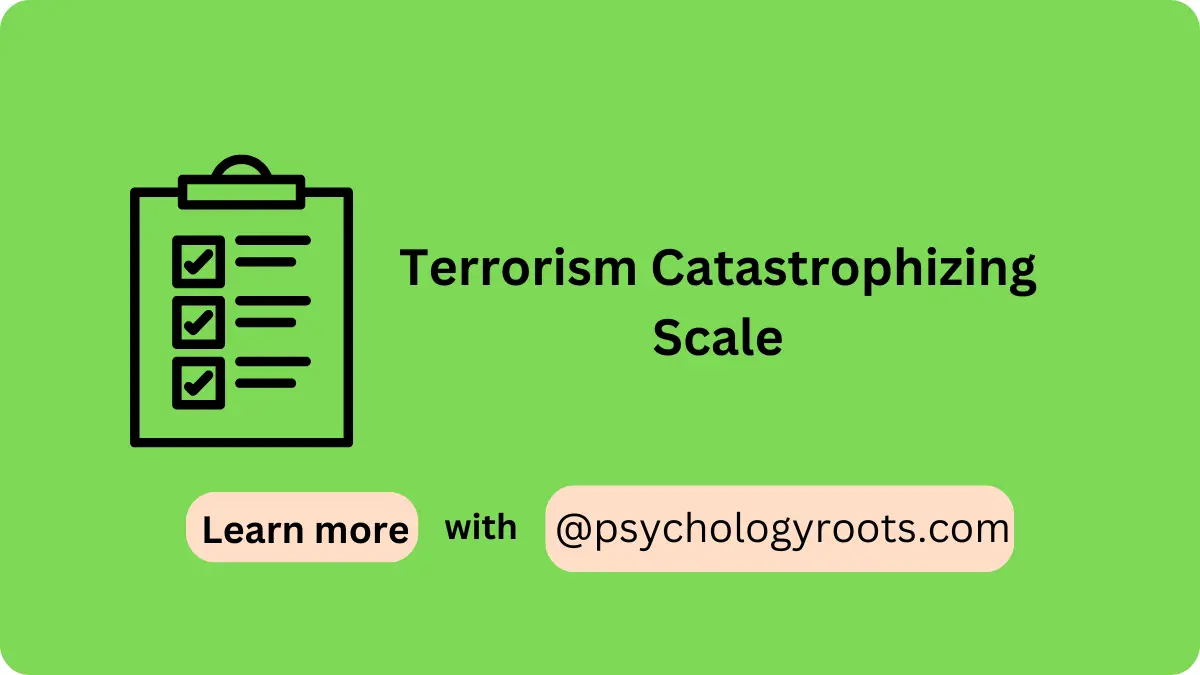Table of Contents
Terrorism Catastrophizing Scale
Here in this post, we are sharing the “Terrorism Catastrophizing Scale”. You can read psychometric and Author information. We have thousands of Scales and questionnaires in our collection (See Scales and Questionnaires). You can demand us any scale and questionnaires related to psychology through our community, and we will provide you with a short time. Keep visiting Psychology Roots.
About Terrorism Catastrophizing Scale
Scale Name
Terrorism Catastrophizing Scale
Author Details
Samuel J. Sinclair and Alice LoCicero
Translation Availability
English

Background/Description
The Terrorism Catastrophizing Scale (TCS), developed by Sinclair and LoCicero (2007), is a 13-item self-report scale designed to assess anticipatory fears of future terrorist attacks in adults. Published in Traumatology, the TCS measures three dimensions: Rumination (5 items, e.g., persistent thoughts about terrorism), Magnification (3 items, e.g., exaggerating terrorism threat), and Helplessness (5 items, e.g., feeling unable to cope with potential attacks). It addresses ongoing psychological impacts of terrorism, distinct from post-event trauma, focusing on prospective fears post-9/11. The scale is grounded in terror management and cognitive-behavioral theories, emphasizing cognitive distortions like catastrophizing.
Participants rate items on a 5-point Likert scale (1 = “Strongly Disagree” to 5 = “Strongly Agree”), with 11 items reverse-scored. Total scores range from 13–65, with higher scores indicating greater catastrophizing. Subscale scores are: Rumination (5–25), Magnification (3–15), Helplessness (5–25). The TCS was validated with 503 adults (mean age ≈ 30–40 years, ~50% female, U.S.-based) via an internet-based study, showing elevated scores in 60–70% of participants post-9/11. It correlates with measures of psychological distress (r ≈ 0.40–0.60) and the Perceptions of Terrorism Questionnaire (r ≈ 0.50–0.70). The TCS is used in clinical psychology, trauma research, and public health to assess terrorism-related fears, inform interventions, and guide mental health planning. For access, contact Samuel Sinclair at jsincl@post.harvard.edu.
Administration, Scoring and Interpretation
- Obtain the scale from Sinclair et al. (2007) or authorized sources (e.g., Traumatology, Samuel Sinclair), ensuring ethical permissions.
- Explain to participants (adults 18+) that the questionnaire assesses fears about future terrorism, emphasizing confidentiality and voluntary participation.
- Administer the 13-item scale in a clinical, research, or community setting, using paper or digital formats, with instructions to rate current feelings about terrorism.
- Estimated completion time is 3–5 minutes.
- Ensure a private, supportive environment; provide mental health resources (e.g., crisis hotlines) and adapt for accessibility (e.g., oral administration) if needed.
Reliability and Validity
The TCS demonstrates strong psychometric properties (Sinclair & LoCicero, 2007; Yasmeen & Kausar, 2022). Internal consistency is high (Cronbach’s alpha = 0.85 for total score; Rumination = 0.80, Magnification = 0.78, Helplessness = 0.82) based on a sample of 503 adults. Test-retest reliability is robust (r = 0.89 over 2 weeks).
Convergent validity is supported by correlations with the Impact of Event Scale-Revised (r ≈ 0.40–0.60), Stress Appraisal Measure (r ≈ 0.50–0.70), and general anxiety measures (r ≈ 0.45–0.65). Factorial validity confirms a three-factor structure (Rumination, Magnification, Helplessness), explaining 50–60% of variance.
Criterion validity is evidenced by its sensitivity to heightened fears in high-risk populations (e.g., post-terrorism events) and differentiation from general anxiety. Discriminant validity is shown by weak correlations with unrelated constructs (e.g., general intelligence, r < 0.20). The scale has been validated in diverse settings, including Pakistan (N = 400 students). Pairing with measures like the PTSD Checklist or State-Trait Anxiety Inventory enhances comprehensive assessment.
Available Versions
13-Items
Reference
Sinclair, S. J., & LoCicero, A. (2007). Fearing future terrorism: Development, validation, and psychometric testing of the Terrorism Catastrophizing Scale (TCS). Traumatology, 13(4), 75-90.
Important Link
Scale File:
Frequently Asked Questions
What does the Terrorism Catastrophizing Scale measure?
It measures anticipatory fears of terrorism, focusing on rumination, magnification, and helplessness.
Who is the target population?
Adults (18+) in clinical, research, or community settings.
How long does it take to administer?
Approximately 3–5 minutes.
Can it inform interventions?
Yes, it assesses terrorism-related fears to guide mental health interventions.
Disclaimer
Please note that Psychology Roots does not have the right to grant permission for the use of any psychological scales or assessments listed on its website. To use any scale or assessment, you must obtain permission directly from the author or translator of the tool. Psychology Roots provides information about various tools and their administration procedures, but it is your responsibility to obtain proper permissions before using any scale or assessment. If you need further information about an author’s contact details, please submit a query to the Psychology Roots team.
Help Us Improve This Article
Have you discovered an inaccuracy? We put out great effort to give accurate and scientifically trustworthy information to our readers. Please notify us if you discover any typographical or grammatical errors.
Make a comment. We acknowledge and appreciate your efforts.
Share With Us
If you have any scale or any material related to psychology kindly share it with us at psychologyroots@gmail.com. We help others on behalf of you.